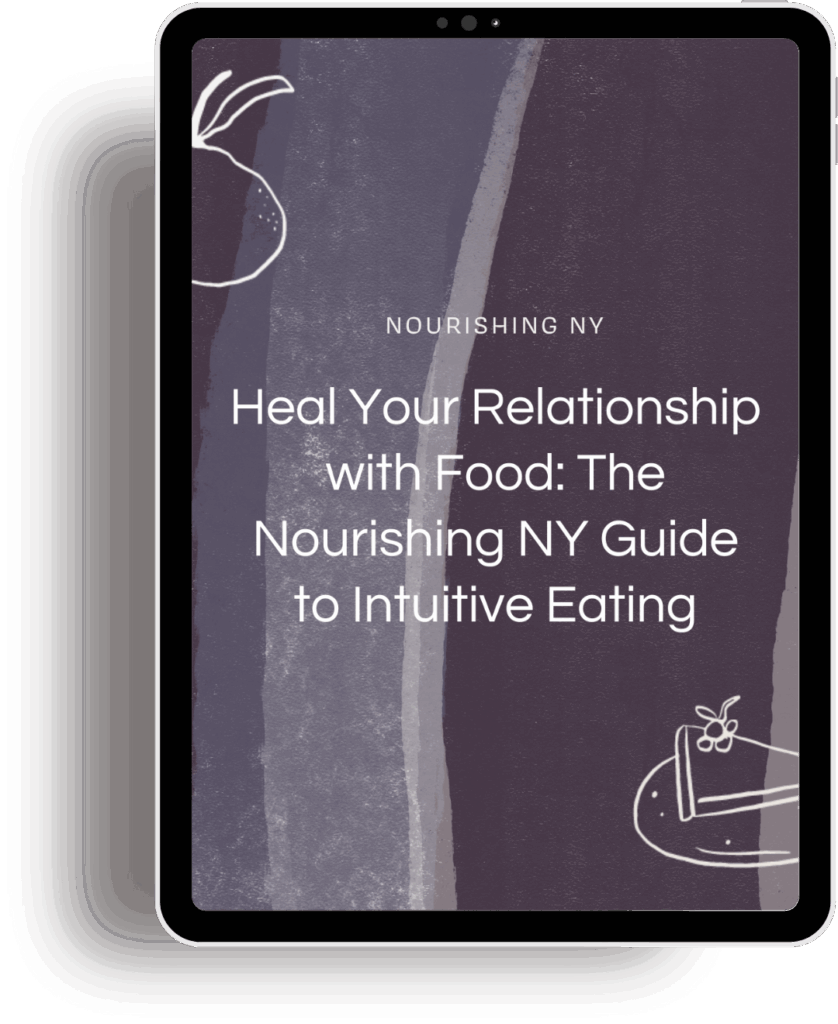It is a common misconception that a dietitian’s role is to be the food police – telling you what to eat, how much, and when. It is widely believed that a dietitian’s only goal is weight loss and traditionally “healthy eating.” While many dietitians do specialize in weight loss, there are plenty of dietitians who specialize in other areas, such as sports, pediatrics, diabetes, and eating disorders.
Dietitians play a unique role on the eating disorder care team, bridging the gap between both the medical and therapeutic aspects of disordered eating. As dietitians for eating disorders, we provide recommendations rooted in science and concrete evidence, which can help debunk some of our society’s most widely believed diet tips. Diet tips are often misinformed and factually incorrect, not to mention potentially harmful for an individual’s relationship with food and body. Individualized nutrition counseling, however, provides informed, compassionate and educated advice that is sustainable for you specifically.
Education and Training of a Registered Dietitian (RD)
Here at Nourishing NY, our team consists of Registered Dietitians, all licensed in the state of New York. A Registered Dietitian’s schooling consists of 3 parts:
- Complete an undergraduate degree from an accredited university, consisting of course work accredited by the Accreditation Council for Education and Nutrition in Dietetics (ACEND) of the Academy of Nutrition and Dietetics (AND).
- Complete a master’s degree from an accredited university, consisting of course work accredited by the Accreditation Council for Education and Nutrition in Dietetics (ACEND) of the Academy of Nutrition and Dietetics (AND).
- Complete an ACEND-accredited supervised practice program. This consists of several rotations in a variety of areas, to allow candidates to gain hands-on experience in the field of dietetics. Rotations may include food service, community, and clinical, which can be further broken into rotations in pediatrics, outpatient, eating disorders, dialysis and intensive care.
Following completion of each of these components, a candidate is eligible to sit for the licensure exam. After passing this exam, Registered Dietitians must meet the regulatory laws/licensure requirements for each state they wish to practice in. Registered Dietitians in NYC must possess licensure in the state of New York in order to see clients in that state. Additionally, continuing education requirements must be met, in order to stay up to date on the latest research and recommendations in the field.
The title of nutritionist, however, is not a protected title, meaning anyone can call themselves a nutritionist without the same level of education, training and expertise that a Registered Dietitian holds. Another term often used is Registered Dietitian-Nutritionist, or RDN, which is interchangeably used with Registered Dietitian. Seeing a Registered Dietitian who specializes in eating disorders in NYC can ensure that you are receiving the most informed, research-based and safest care possible.
Medical-Nutritional Therapy vs. General Diet Advice
A Registered Dietitian for eating disorders works alongside doctors, therapists and psychiatrists to provide the most well-rounded care possible. Dietitians are educated in providing evidence-backed nutrition counseling for a variety of medical conditions, including eating disorders. These can include: Avoidant Restrictive Food Intake Disorder (ARFID), anorexia, binge eating and orthorexia. Eating disorders are very complex from both a physical and mental/emotional standpoint. Therefore, a very nuanced, individualized and educated approach is required. Treatment plans may include behavior changes, food exposures, meal planning and mindfulness exercises to aid in the re-nourishment process. Medical nutrition therapy addresses the root of the condition, whereas general diet advice is often ineffective, uneducated and broad. Working with a registered dietitian in NYC may help renourish your body, create sustainable habits and repair your relationship with your food.
The Role of Compassionate, Individualized Care
Nourishing NY’s team of Registered Dietitians for eating disorders are passionate about individualized, inclusive care. We recognize that no two journeys are the same and work hard to explore the approach that works best for you. Eating disorder recovery is not a one-size-fits-all approach. Just as we are the experts in food and nutrition, you are the expert on you. Each experience is different, and may be impacted by trauma, one’s own values, family life and culture. Techniques of body image support, normalization of eating and mindfulness may look different for everyone, which we understand and celebrate at Nourishing NY. We are here to walk with you through eating disorder recovery by providing trauma-informed, compassionate and inclusive tools to help along the way.
Why NYC Residents Benefit From Seeing an ED-Specialized RD
Here at Nourishing NY, we understand the high-pressure and appearance-focused culture that exists in the world today, especially in NYC. While the city is a place where all walks of life come together, it can also foster an environment of extreme pressure to meet unrealistic (or unhealthy) standards. Our team of Registered Dietitians for eating disorders have experience and expertise in a variety of complex cases, and we understand how NYC culture may exacerbate eating disorders. Our practice provides the option of both in-person or virtual appointments, allowing for our clients to receive care in the most convenient and comfortable way possible.
When to Seek Help
Eating disorders may present themselves in a variety of ways. Some common warning signs include the following:
- Discomfort eating in front of others
- Discomfort eating at restaurants
- Cutting out certain foods/food groups (ex. Carbs, sugar, fats)
- Withdrawal from friends/family and social outings
- Irritability
- Preoccupation with food, weight, and body image
- Extreme calorie counting
- Rigidity in meal composition/meal times
- Weight fluctuations
- Sleep disturbances
- Headaches, dizziness, fatigue, brain fog
- Abnormal period or loss of period
If you are struggling with disordered eating, or resonate with the above symptoms, please submit an inquiry describing what you are experiencing to determine if working with one of our registered dietitians for eating disorders is the right fit for you. Our inquiry form can be found HERE. If you are a provider looking to refer a client, please see HERE for our provider referral form.
We are proud to accept insurance, as one of the core foundations of our practice is making care as accessible and affordable as possible. See HERE for the list of insurance plans we accept.
Addressing your relationship with food and body can feel extremely daunting. We understand that starting this process is a big step towards recovery, and hope that we can help provide a safe space in your healing journey.



